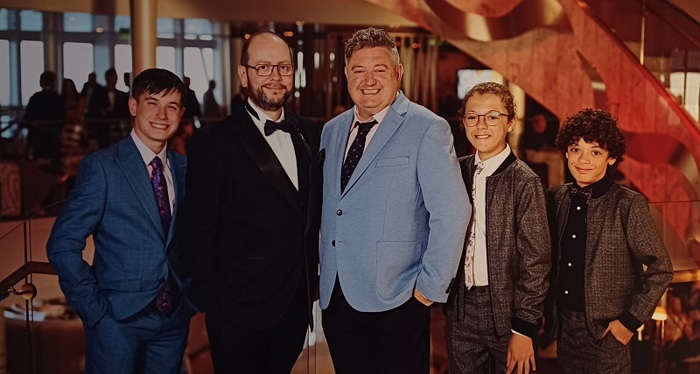Patient story published 26 February 2024
David Jones-Stanley is a 49-year-old operations director who lives in Wigan. He has been with his husband James for 28 years and the pair have 3 boys – aged 19, 13 and 11.
David was diagnosed with stage 3 food pipe (oesophageal) cancer in October 2021.
He didn’t have a lot of the traditional symptoms like heartburn or acid reflux but knew something was wrong when he went to get some ham from the fridge and couldn’t swallow it. He went to his local hospital for an endoscopy and CT scan and was told that he had cancer of the oesophagus.
He was referred to The Christie NHS Foundation Trust, a specialist cancer centre in Manchester, for 4 sessions of chemotherapy over 8 weeks to shrink the tumours as much as possible and improve the chance of cure. The chemotherapy was delivered on the chemotherapy day unit, and with one of the drugs administered in an ambulatory setting with David returning home with the chemotherapy still running for 24 hours via an electric pump.
Once that was completed, he had an 11-hour operation. Surgeons removed his food pipe and reshaped his stomach so the top of it could be stretched to form a new food pipe. As a result, his stomach is now a lot smaller than before, and he eats 6 or 7 small meals a day. It also sits a lot higher in his body.
The operation was successful, and David spent 6 weeks recovering before returning to The Christie for a second round of the same chemotherapy with a further 4 sessions over 8 weeks. He is now cancer-free and taking part in a clinical trial.
Add-Aspirin is a phase 3, double-blind clinical trial, which is taking place in the UK, the Republic of Ireland and India. It will recruit 11,000 participants to help find out whether regular aspirin use after treatment can prevent the cancer from coming back.

“I feel so lucky to have The Christie so near to me,” comments David. The experience I’ve had, although difficult, has been extremely positive. Everyone at The Christie was great – they made me feel safe at a time when I was most vulnerable. The support I’ve received both before during and after treatment has been fantastic.”
“It’s great to see that David is doing so well after having been through such a prolonged course of treatment”, comments Dr Tom Waddell, consultant oncologist at The Christie. “Oesophageal cancer can be hard to treat, especially when it’s more advanced, so people should go to the GP as soon as possible if they have any concerns. Here at The Christie, we have over 120 years in cancer care research and education, and we are involved in trials to both better prevent and treat oesophageal cancer.”
Any patients interested in taking part in clinical trials should discuss this option with their consultant or GP. Not all patients will fit the criteria for a specific trial. While clinical trials can be successful for some patients, outcomes can vary from case to case. More information about taking part in clinical trials can be found on our taking part in studies and trials page.
